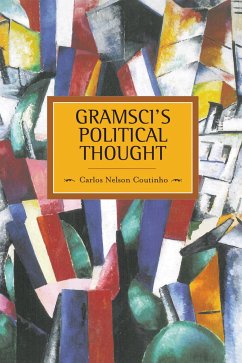Carlos Nelson Coutinho
Gramsci's Political Thought
Carlos Nelson Coutinho
Gramsci's Political Thought
- Broschiertes Buch
- Merkliste
- Auf die Merkliste
- Bewerten Bewerten
- Teilen
- Produkt teilen
- Produkterinnerung
- Produkterinnerung
One of the most succinct and theoretically focused introductions to the thought of Antonio Gramsci available internationally.
Andere Kunden interessierten sich auch für
![The Thatcherite Offensive The Thatcherite Offensive]() Alexander GallasThe Thatcherite Offensive27,99 €
Alexander GallasThe Thatcherite Offensive27,99 €![Looking for the Proletariat Looking for the Proletariat]() Stephen Hastings-KingLooking for the Proletariat42,99 €
Stephen Hastings-KingLooking for the Proletariat42,99 €![The Making of Capitalism in France The Making of Capitalism in France]() Xavier LafranceThe Making of Capitalism in France32,99 €
Xavier LafranceThe Making of Capitalism in France32,99 €![State and Society in Eighteenth-Century France State and Society in Eighteenth-Century France]() Stephen MillerState and Society in Eighteenth-Century France27,99 €
Stephen MillerState and Society in Eighteenth-Century France27,99 €![Trotsky and the Problem of Soviet Bureaucracy Trotsky and the Problem of Soviet Bureaucracy]() Thomas TwissTrotsky and the Problem of Soviet Bureaucracy47,99 €
Thomas TwissTrotsky and the Problem of Soviet Bureaucracy47,99 €![Sylvain Maréchal, the Godless Man Sylvain Maréchal, the Godless Man]() Maurice DommangetSylvain Maréchal, the Godless Man42,99 €
Maurice DommangetSylvain Maréchal, the Godless Man42,99 €![Lenin and the Logic of Hegemony Lenin and the Logic of Hegemony]() Alan ShandroLenin and the Logic of Hegemony37,99 €
Alan ShandroLenin and the Logic of Hegemony37,99 €-
-
-
One of the most succinct and theoretically focused introductions to the thought of Antonio Gramsci available internationally.
Hinweis: Dieser Artikel kann nur an eine deutsche Lieferadresse ausgeliefert werden.
Hinweis: Dieser Artikel kann nur an eine deutsche Lieferadresse ausgeliefert werden.
Produktdetails
- Produktdetails
- Verlag: Haymarket Books
- Seitenzahl: 198
- Erscheinungstermin: 13. August 2013
- Englisch
- Abmessung: 228mm x 154mm x 15mm
- Gewicht: 313g
- ISBN-13: 9781608462773
- ISBN-10: 1608462773
- Artikelnr.: 36631065
- Herstellerkennzeichnung
- Libri GmbH
- Europaallee 1
- 36244 Bad Hersfeld
- gpsr@libri.de
- Verlag: Haymarket Books
- Seitenzahl: 198
- Erscheinungstermin: 13. August 2013
- Englisch
- Abmessung: 228mm x 154mm x 15mm
- Gewicht: 313g
- ISBN-13: 9781608462773
- ISBN-10: 1608462773
- Artikelnr.: 36631065
- Herstellerkennzeichnung
- Libri GmbH
- Europaallee 1
- 36244 Bad Hersfeld
- gpsr@libri.de
Carlos Nelson Coutinho is Professor Emeritus of Political Theory at Universidade Federal do Rio de Janeiro, Brasil. He is the author of several books on political theory, such as: Marxismo e política (São Paulo, Cortez, 2008; Santiago de Chile, Lom Ediciones, 2011) and De Rousseau a Gramsci (São Paulo, Boitempo, 2011). Professor Coutinho is editor of the Brazilian version of The Complete Works of Antonio Gramsci (Obras de Antonio Gramsci), published in ten volumes (1999-2004)
Preface
Introduction by Joseph A. Buttigieg
1. Youth, a Contradictory Formation: 1910-18
1.1. Sardinia
1.2. The encounter with Croce and Gentile
1.3. Gramsci turns away from the Marxism of the Second International
2. Workers' Democracy and Factory-Councils: 1919-20
2.1. L'Ordine Nuovo
2.2. Gramsci and Bordiga
2.3. The defeat of the councils
3. The Passage to Maturity: 1921-6
3.1. From the foundation of the PCd'I to the fight against Fascism
3.2. The struggle against sectarianism
3.3. The first formulations of the concept of hegemony
4. Methodological Observations on the Prison Notebooks
4.1. The systematic nature of the Notebooks
4.2. Gramsci's place in the evolution of Marxism
4.3. Gramsci as a critic of politics
4.4. On the relations between politics, economics and social totality
4.5. Gramsci's philosophical conceptions
5. The 'Extended' Theory of the State
5.1. The concept of 'civil society'
5.2. 'Regulated society' and the end of the state
6. Socialist Strategy in the 'West'
6.1. War of movement and war of position
6.2. On the concept of passive revolution
6.3. From Gramsci's proposal of a 'constituent assembly' to Togliatti's
'progressive democracy'
7. The Party as 'Collective Intellectual'
8. The Current Relevance and Universality of Gramsci
8.1. Another socialist model
8.2. A radical conception of democracy
8.3. With Gramsci, beyond Gramsci
Appendix One: General Will and Democracy in Rousseau, Hegel and Gramsci
1.1. The priority of the public
1.2. Rousseau and the general will
1.3. Hegel and the determinations of will
1.4. Gramsci and hegemony as contract
Appendix Two: The Neoliberal Age: Passive Revolution or
Counter-Reformation?
2.1. Passive revolution
2.2. Counter-reformation
2.3. The welfare-state as passive revolution
2.4. Neoliberalism as counter-reformation
2.5. Transformism
Appendix Three: Gramsci and Brazil
3.1. Reception
3.2. Uses
References
Index
Introduction by Joseph A. Buttigieg
1. Youth, a Contradictory Formation: 1910-18
1.1. Sardinia
1.2. The encounter with Croce and Gentile
1.3. Gramsci turns away from the Marxism of the Second International
2. Workers' Democracy and Factory-Councils: 1919-20
2.1. L'Ordine Nuovo
2.2. Gramsci and Bordiga
2.3. The defeat of the councils
3. The Passage to Maturity: 1921-6
3.1. From the foundation of the PCd'I to the fight against Fascism
3.2. The struggle against sectarianism
3.3. The first formulations of the concept of hegemony
4. Methodological Observations on the Prison Notebooks
4.1. The systematic nature of the Notebooks
4.2. Gramsci's place in the evolution of Marxism
4.3. Gramsci as a critic of politics
4.4. On the relations between politics, economics and social totality
4.5. Gramsci's philosophical conceptions
5. The 'Extended' Theory of the State
5.1. The concept of 'civil society'
5.2. 'Regulated society' and the end of the state
6. Socialist Strategy in the 'West'
6.1. War of movement and war of position
6.2. On the concept of passive revolution
6.3. From Gramsci's proposal of a 'constituent assembly' to Togliatti's
'progressive democracy'
7. The Party as 'Collective Intellectual'
8. The Current Relevance and Universality of Gramsci
8.1. Another socialist model
8.2. A radical conception of democracy
8.3. With Gramsci, beyond Gramsci
Appendix One: General Will and Democracy in Rousseau, Hegel and Gramsci
1.1. The priority of the public
1.2. Rousseau and the general will
1.3. Hegel and the determinations of will
1.4. Gramsci and hegemony as contract
Appendix Two: The Neoliberal Age: Passive Revolution or
Counter-Reformation?
2.1. Passive revolution
2.2. Counter-reformation
2.3. The welfare-state as passive revolution
2.4. Neoliberalism as counter-reformation
2.5. Transformism
Appendix Three: Gramsci and Brazil
3.1. Reception
3.2. Uses
References
Index
Preface
Introduction by Joseph A. Buttigieg
1. Youth, a Contradictory Formation: 1910-18
1.1. Sardinia
1.2. The encounter with Croce and Gentile
1.3. Gramsci turns away from the Marxism of the Second International
2. Workers' Democracy and Factory-Councils: 1919-20
2.1. L'Ordine Nuovo
2.2. Gramsci and Bordiga
2.3. The defeat of the councils
3. The Passage to Maturity: 1921-6
3.1. From the foundation of the PCd'I to the fight against Fascism
3.2. The struggle against sectarianism
3.3. The first formulations of the concept of hegemony
4. Methodological Observations on the Prison Notebooks
4.1. The systematic nature of the Notebooks
4.2. Gramsci's place in the evolution of Marxism
4.3. Gramsci as a critic of politics
4.4. On the relations between politics, economics and social totality
4.5. Gramsci's philosophical conceptions
5. The 'Extended' Theory of the State
5.1. The concept of 'civil society'
5.2. 'Regulated society' and the end of the state
6. Socialist Strategy in the 'West'
6.1. War of movement and war of position
6.2. On the concept of passive revolution
6.3. From Gramsci's proposal of a 'constituent assembly' to Togliatti's
'progressive democracy'
7. The Party as 'Collective Intellectual'
8. The Current Relevance and Universality of Gramsci
8.1. Another socialist model
8.2. A radical conception of democracy
8.3. With Gramsci, beyond Gramsci
Appendix One: General Will and Democracy in Rousseau, Hegel and Gramsci
1.1. The priority of the public
1.2. Rousseau and the general will
1.3. Hegel and the determinations of will
1.4. Gramsci and hegemony as contract
Appendix Two: The Neoliberal Age: Passive Revolution or
Counter-Reformation?
2.1. Passive revolution
2.2. Counter-reformation
2.3. The welfare-state as passive revolution
2.4. Neoliberalism as counter-reformation
2.5. Transformism
Appendix Three: Gramsci and Brazil
3.1. Reception
3.2. Uses
References
Index
Introduction by Joseph A. Buttigieg
1. Youth, a Contradictory Formation: 1910-18
1.1. Sardinia
1.2. The encounter with Croce and Gentile
1.3. Gramsci turns away from the Marxism of the Second International
2. Workers' Democracy and Factory-Councils: 1919-20
2.1. L'Ordine Nuovo
2.2. Gramsci and Bordiga
2.3. The defeat of the councils
3. The Passage to Maturity: 1921-6
3.1. From the foundation of the PCd'I to the fight against Fascism
3.2. The struggle against sectarianism
3.3. The first formulations of the concept of hegemony
4. Methodological Observations on the Prison Notebooks
4.1. The systematic nature of the Notebooks
4.2. Gramsci's place in the evolution of Marxism
4.3. Gramsci as a critic of politics
4.4. On the relations between politics, economics and social totality
4.5. Gramsci's philosophical conceptions
5. The 'Extended' Theory of the State
5.1. The concept of 'civil society'
5.2. 'Regulated society' and the end of the state
6. Socialist Strategy in the 'West'
6.1. War of movement and war of position
6.2. On the concept of passive revolution
6.3. From Gramsci's proposal of a 'constituent assembly' to Togliatti's
'progressive democracy'
7. The Party as 'Collective Intellectual'
8. The Current Relevance and Universality of Gramsci
8.1. Another socialist model
8.2. A radical conception of democracy
8.3. With Gramsci, beyond Gramsci
Appendix One: General Will and Democracy in Rousseau, Hegel and Gramsci
1.1. The priority of the public
1.2. Rousseau and the general will
1.3. Hegel and the determinations of will
1.4. Gramsci and hegemony as contract
Appendix Two: The Neoliberal Age: Passive Revolution or
Counter-Reformation?
2.1. Passive revolution
2.2. Counter-reformation
2.3. The welfare-state as passive revolution
2.4. Neoliberalism as counter-reformation
2.5. Transformism
Appendix Three: Gramsci and Brazil
3.1. Reception
3.2. Uses
References
Index








